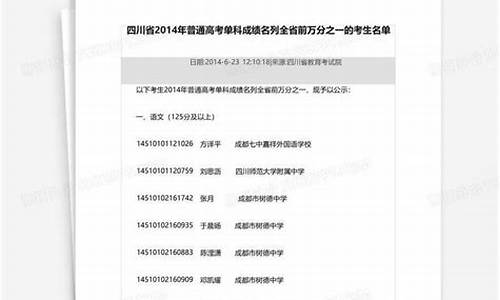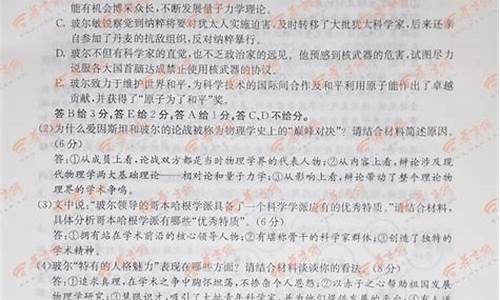您现在的位置是: 首页 > 高考调剂 高考调剂
北京高考英语阅读,北京高考英语阅读cd篇
tamoadmin 2024-05-22 人已围观
简介1.高考英语阅读理解Sara tried to befriend her old friend Steve’s new wife, but Betty never seemed to have anything to say. While Sara felt Betty didn’t hold up her end of the conversation, Betty complained to
1.高考英语阅读理解

Sara tried to befriend her old friend Steve’s new wife, but Betty never seemed to have anything to say. While Sara felt Betty didn’t hold up her end of the conversation, Betty complained to Steve that Sara never gave her a chance to talk. The problem had to do with expectations about pacing and pausing.
萨拉想和她的老朋友史蒂夫的新婚妻子贝蒂交朋友,但贝蒂似乎没什么表示。萨拉觉得贝蒂没有打断她的谈话时,贝蒂向史蒂夫抱怨说萨拉从来没有给过她说话的机会。这个问题与人们对节奏和停顿的期望有关。
Conversation is a turn-taking game. When our habits are similar, there’s no problem. But if our habits are different, you may start to talk before I’m finished or fail to take your turn when I’m finished. That’s what was happening with Betty and Sara.
谈话是一种轮流进行的游戏。当我们的习惯相似时,没有问题。但是如果我们的习惯不同,你可能在我说完之前就开始说,或者在我说完的时候你没有接上。贝蒂和莎拉就是这样。
It may not be coincidental that Betty, who expected relatively longer pauses between turns, is British, and Sara, who expected relatively shorter pauses, is American. Betty often felt interrupted by Sara. But Betty herself became an interrupter and found herself doing most of the talking when she met a visitor from Finland. And Sara had a hard time cutting in on some speakers from Latin America or Israel.
这可能不是巧合,贝蒂是英国人,她期望在转换之间停顿长一点,而萨拉是美国人,她期望停顿短一点。贝蒂常常感到被萨拉打断,但是当她遇到来自芬兰的客人时,她自己成了打断别人的人,总是自己在说。萨拉在遇到来自拉美或以色列的发言者讲话时也很难插嘴。
The general phenomenon, then, is that the small conversation techniques, like pacing and pausing, lead people to draw conclusions not about conversational style but about personality and abilities. These habitual differences are often the basis for dangerous stereotyping. And these social phenomena can have very personal consequences. For example, a woman from the southwestern part of the US went to live in an eastern city to take up a job in personnel. When the Personnel Department got together for meetings, she kept searching for the right time to break in--and never found it. Although back home she was considered outgoing and confident, in Washington she was viewed as shy and retiring. When she was evaluated at the end of the year, she was told to take a training course because of her inability to speak up.
通常就是这样,像节奏和停顿这样的谈话小技巧会让人们得出关于个性和能力的结论,而不是关于谈话风格。这些习惯性差异往往是危险的思维定式的基础,这些社会现象会产生非常私人的后果。例如,一位来自美国西南部的妇女到东部城市居住,从事人事工作。当人事部开会时,她会一直在寻找合适的时间插话——但始终没有找到。虽然在家乡她被认为是外向和自信,但在华盛顿她则被认为是害羞,不善与人交往。年底对她考评时,被告知要参加培训,因为她不会说话。
That’s why slight differences in conversational style --- tiny little things like microseconds of pause --- can have a great effect on one’s life. The result in this case was a judgment of psychological problems --- even in the mind of the woman herself, who really wondered what was wrong with her and registered for assertiveness training.
这就是为什么谈话风格上的细微差别——像几微秒停顿这样的小事——会对一个人的生活产生巨大影响。案例的结果是对心理问题的判断——甚至在这位女士自己的头脑中,她真的很想知道她到底有什么问题,而去报名参加自信心培训。
高考英语阅读理解
2023北京高考英语试题总体来说不难。
有考生表示北京卷一点也不容易,完形填空,考生都没看懂文章在讲什么,所以填选项时,也是很懵逼。阅读理解也有的题目没读懂,词汇量是挺大的,并说这张试卷还是挺难的,大家是都觉得这张试卷出的还是有水平的,比平时难多了。
高考英语北京卷一贯注重对思维能力的考查,鼓励考生挖掘篇章的深层含义,读懂言外之意。阅读试题进一步加强了对分析推断信息的能力和解决问题的能力的考查。
书面表达的交际场合设置明确,符合考生的认知水平,交际语境符合学生身份,考查了考生的综合语言运用能力,引导考生使用英语做事情,体现了英语的应用性。
应用文中,考生需要结合生活实际,合理地用英语写出被推荐人的条件和要求,贴近考生的生活实际,体现了用英语做事情。情景作文要求考生写一篇以“自律”为主题的调研活动过程,符合当前的疫情下学生居家学习的社会环境和学生的身份。
北京高考英语考点:
一、坚持“立德树人”,实现高考评价目标与素质教育目标的内在统一:2020年高考英语(北京卷)以“立德树人”为主线,将理想信念、品德修养等核心价值的要求有机融入到试题中,突显学科育人功能,引导学生树立正确的世界观、人生观和价值观,体现了“将试题打造成为素质教育的重要载体”的命题指导思想。
二、注重英语学科素养,实现核心价值与关键能力、必备知识的有效融合:2020年高考英语(北京卷)体现了对英语学科素养的考查,强调在核心价值引领下。
运用必备知识对语篇理解、概括和分析以及对文本进行构建和准确得体表达的关键能力,包括与之密切相关的文化意识、思维品质和学习能力。
三、强调以情境承载考查内容,实现在情境中考查语言综合运用能力的核心要求:2020年高考英语(北京卷)以情境为载体。
在贴近时代、贴近社会、贴近生活的情境中考查学生运用必备知识理解和表达意义、情感和观点的能力,突显在情境中认识问题、分析问题和解决问题的核心要求。
四、引领教学导向,实现评价为教学服务的根本宗旨:2020年高考英语(北京卷)契合高中课程改革理念,强调思维在语言学习中的重要性。
鼓励学生能用英语,会用英语,学以致用,促进英语学科核心素养落实,真正实现英语教学的语言交流目标、思维认知目标和社会文化目标。
2010 北京卷 D 段
The Cost of Higher Education_免费的大学教育不合理
这篇文章逻辑推理非常严密,正反方阐述也相当有力。标准总分总结构。
Individuals should pay for their higher education.
A university education is of huge and direct benefit to the individual. Graduates earn more than non-graduates. Meanwhile, social mobility is ever more dependent on having a degree. However, only some people have it. So the individual, not the taxpayers, should pay for it. There are pressing calls on the resources of the government. Using taxpayers' money to help a small number of people to earn high incomes in the future is not one of them.
Full government funding is not very good for universities. Adam Smith worked in a Scottish university whose teachers lived off student fees. He knew and looked down upon 18th-century Oxford, where the academics lived comfortably off the income received from the government. Guaranteed salaries, Smith argued, were the enemy of hard work; and when the academics were lazy and incompetent, the students were similarly lazy.
If students have to pay for their education, they not only work harder, but also demand more from their teachers. And their teachers have to keep them satisfied. If that means taking teaching seriously, and giving less time to their own research interests, that is surely something to celebrate.
Many people believe that higher education should be free because it is good for the economy. Many graduates clearly do contribute to national wealth, but so do all the businesses that invest and create jobs. If you believe that the government should pay for higher education because graduates are economically productive, you should also believe that the government should pay part of business costs. Anyone promising to create jobs should receive a gift of capital from the government to invest.
Therefore, it is the individual, not the government who should pay for their university education.









